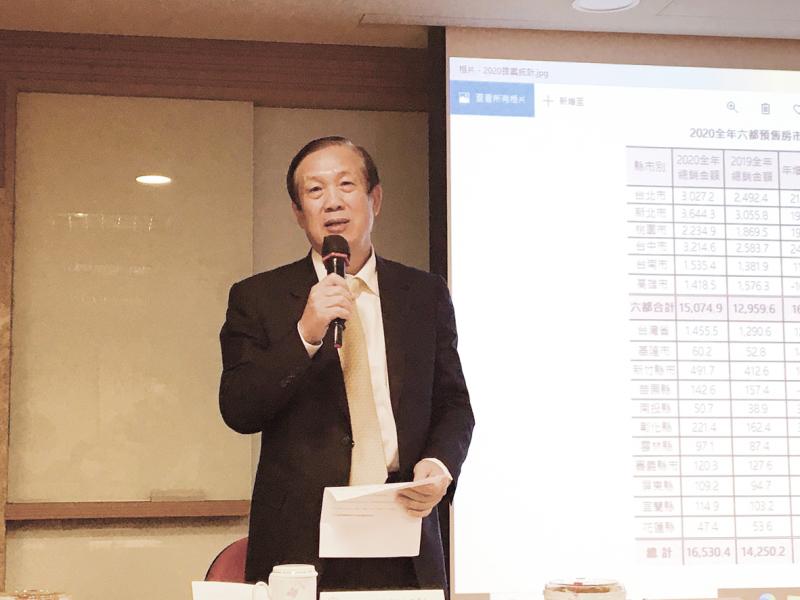The number of presale housing projects next year might shrink 10 percent to NT$1.48 trillion (US$51.83 billion), ending a four-year upward trend following a spate of unfavorable policies meant to keep property prices from rising, the General Chamber of Commerce (GCC, 全國商業總會) said yesterday.
The projected retreat would come amid softening buying interest after the central bank tightened credit controls on home purchases by companies, as well as unsold houses and land financing, GCC chairman Lai Cheng-i (賴正鎰) said.
The Ministry of the Interior has also banned the transfer of presale projects prior to their official launches and the Financial Supervisory Commission is stepping up inspections of mortgage operations by local banks.

Photo: CNA
“The government should learn to respect the market mechanism and quit intervention whenever house prices pick up,” said Lai, who owns Taichung-based Shining Group (鄉林集團) and luxury hotel brand Lalu (涵碧樓).
Higher building material prices and labor costs accounted for property price hikes this year, Lai said, adding that capital repatriation — by companies returning from China and those dodging higher income taxes abroad — also lent support.
Real demand, especially for industrial plots by reshoring companies, has driven land owners to engage in price gouging, but policymakers have held developers and builders accountable, he said.
Several companies have asked the chamber to help find industrial plots, as some are even more expensive than residential lots, an “unreasonable phenomenon,” Lai added.
Land deals and property development next year could weaken now that real-estate financing is capped at 55 percent, from 80 percent previously, he said.
The scenario bodes ill for the nation’s economic recovery and could discourage companies from moving production lines home from China, he said.
The property market has not fully recovered, as there are still few buyers for apartments of 100 ping (331m2) or more, Lai added.
First-time home buyers and people with relocation needs account for sales of most small apartments, he said, adding that such real demand would continue to bolster property prices.
GCC supervisor Hsieh Kun-chen (謝坤成) said that he welcomed the government’s crackdown on unlicensed presale project transfers and dishonest promotional tactics.
However, the government should grant a six-month grace period so that developers and buyers have time to adjust to tightened credit controls and honor prior purchase agreements, Hsieh said.
Funds would continue to flow to the property market amid abundant liquidity and low interest rates, he added.

Taiwan Semiconductor Manufacturing Co (TSMC, 台積電), the world’s biggest contract chipmaker, booked its first-ever profit from its Arizona subsidiary in the first half of this year, four years after operations began, a company financial statement showed. Wholly owned by TSMC, the Arizona unit contributed NT$4.52 billion (US$150.1 million) in net profit, compared with a loss of NT$4.34 billion a year earlier, the statement showed. The company attributed the turnaround to strong market demand and high factory utilization. The Arizona unit counts Apple Inc, Nvidia Corp and Advanced Micro Devices Inc among its major customers. The firm’s first fab in Arizona began high-volume production

VOTE OF CONFIDENCE: The Japanese company is adding Intel to an investment portfolio that includes artificial intelligence linchpins Nvidia Corp and TSMC Softbank Group Corp agreed to buy US$2 billion of Intel Corp stock, a surprise deal to shore up a struggling US name while boosting its own chip ambitions. The Japanese company, which is adding Intel to an investment portfolio that includes artificial intelligence (AI) linchpins Nvidia Corp and Taiwan Semiconductor Manufacturing Co (TSMC, 台積電), is to pay US$23 a share — a small discount to Intel’s last close. Shares of the US chipmaker, which would issue new stock to Softbank, surged more than 5 percent in after-hours trading. Softbank’s stock fell as much as 5.4 percent on Tuesday in Tokyo, its

COLLABORATION: Softbank would supply manufacturing gear to the factory, and a joint venture would make AI data center equipment, Young Liu said Hon Hai Precision Industry Co (鴻海精密) would operate a US factory owned by Softbank Group Corp, setting up what is in the running to be the first manufacturing site in the Japanese company’s US$500 billion Stargate venture with OpenAI and Oracle Corp. Softbank is acquiring Hon Hai’s electric-vehicle plant in Ohio, but the Taiwanese company would continue to run the complex after turning it into an artificial intelligence (AI) server production plant, Hon Hai chairman Young Liu (劉揚偉) said yesterday. Softbank would supply manufacturing gear to the factory, and a joint venture between the two companies would make AI data

The Taiwan Automation Intelligence and Robot Show, which is to be held from Wednesday to Saturday at the Taipei Nangang Exhibition Center, would showcase the latest in artificial intelligence (AI)-driven robotics and automation technologies, the organizer said yesterday. The event would highlight applications in smart manufacturing, as well as information and communications technology, the Taiwan Automation Intelligence and Robotics Association said. More than 1,000 companies are to display innovations in semiconductors, electromechanics, industrial automation and intelligent manufacturing, it said in a news release. Visitors can explore automated guided vehicles, 3D machine vision systems and AI-powered applications at the show, along